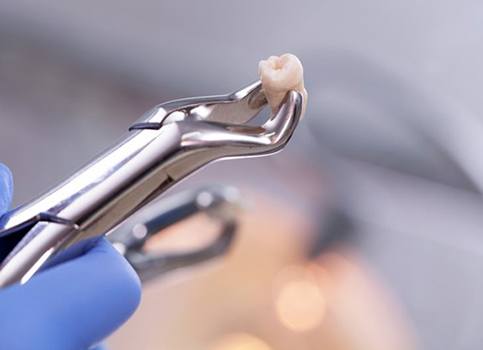

The decision to remove a tooth is never an easy one. Dr. Volker has a wide array of advanced methods for treating and fixing an injured or infected tooth, and all these options will be explored first. However, there is always a chance that a tooth will need to be extracted, and it’ll be our goal to make the procedure as well as the task of finding a replacement as easy for you as possible. Learn more about tooth extractions in Sunnyside, NY at Dent-Care Dental by calling our dental office today.

Generally speaking, a tooth should be removed if it has been damaged so badly that it can’t be salvaged by a crown, root canal therapy, or any other kind of treatment. Extremely advanced tooth decay and severe physical trauma are both common reasons for an extraction. The procedure might also be necessary if gum disease has destroyed much of the bone tissue used to support the tooth. And as you’re probably aware, the wisdom teeth are routinely removed for health reasons.

Your mouth will need about 7 to 10 days to fully recover from an extraction. During this time, you should focus on protecting the site where the tooth was removed and also managing your own pain. Take ibuprofen or similar medications as prescribed and apply an ice bag to keep any swelling down. During the first 24 hours, avoid rinsing, spitting, or using a straw. Also, to lower the risk of infection, periodically rinse with 8 ounces of warm water mixed with a teaspoon of salt.

A tooth extraction is an irreversible and serious procedure, which is why we want our patients to be well-informed about this treatment before moving forward with it. For this reason, we’ve answered a few of the questions about tooth extractions that our patients bring to us the most often. Of course, if you have concerns that are not addressed on this page, feel free to reach out to us. Our team is always happy to help!
Our dentists may need to perform one or more additional tests before we can schedule the actual extraction. We’ll give you specific guidelines on how to prepare for your procedure based on your unique circumstances. The details of your treatment plan will probably change if you have certain medical conditions. For example, if you have a weakened immune system, you may have a higher risk of infection after your surgery. In that case, we will most likely prescribe antibiotics to reduce the possibility of post-op complications.
Getting a tooth removed might sound like it would hurt, but modern dental technology has come a long way in terms of reducing pain. Before we begin the procedure, we’ll administer a potent local anesthetic to the area of your mouth that we’ll be working on. We won’t proceed with the extraction until you’re ready to move forward. Believe it or not, most patients actually report after the fact that their tooth extraction was much more comfortable than they had expected it to be.
After the numbness subsides, it’s common to experience discomfort. You can expect some degree of bleeding and swelling for the first 24 hours. In most cases, taking your pain medication as directed and applying a cold compress to your cheek in regular intervals can help you get through this recovery process.
That said, be sure to keep an eye out for signs of complications after the extraction, such as infection. Contact our office immediately if you experience nausea, vomiting, fever, chills, shortness of breath, coughing, chest pain, or pain in the extraction site that intensifies instead of fading after three days.
While wisdom teeth don’t need to be replaced, a whole host of oral health complications can arise if other missing teeth are not replaced. Leaving a gap in your grin can cause the adjacent teeth to drift out of position. This can cause painful chewing, orthodontic problems, and greater difficulty replacing the tooth later on. Not to mention, you’ll naturally feel more comfortable smiling when you have a full set of pearly whites to display.
At Dent-Care Dental, we offer several options to replace missing teeth, including dental bridges and dentures. However, we usually recommend dental implants because they look, feel, and function almost exactly like real teeth. We’ll discuss your tooth replacement options and help you choose the one that best fits your unique smile and budget.
I Need a Checkup & Cleaning I am Looking for a Dentist for My Child I am Concerned About Bleeding Gums I Have a Cavity or Broken Tooth I am Missing One or More Teeth I am Unhappy with My Smile I Want a Straighter Smile I am in Pain & Need Help I Need My Wisdom Teeth Removed BioClearView Our Services